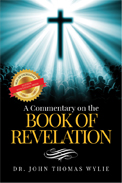
 |
Author Wylie has constructed a guide to the Book of Revelation in the Bible, supporting its standing as God's word. The book's creator, John, transcribed his prophesies while imprisoned by Roman rulers. John was certainly acquainted with the role of Jesus as Christ, though he claims no apostolic or other direct role with Jesus. The book would have been written, Wylie asserts, during the reign of Domitian, whose mistreatment of Christians was widespread. This harsh intolerance and John's love of God evoked his message, not as a "dark" prediction but as a logical assumption from what was readily observable around him.
Though John's prophecies have yet to be fulfilled, refusing to believe them as written is perilous, Wylie feels, as he explores John's book in scrupulous detail. As an example, when John predicts an apocalyptic messenger who "poured out his vial upon the sun," Wylie theorizes that the warmth so generated could come from "atomic fighting" or "drained ozone in the environment," two clearly modern phenomena. Overall, Wylie envisions a struggle between good and evil and the triumph of "the Lord's grandness," as predicted in John's book.
Wylie has been fascinated by the Book of Revelation since he was a student preparing for a role as a minister and educator. His text elucidates the work's deeper meanings and follows its narration with almost line-by-line quotations, along with references from other portions of the Bible. He is convinced that Revelation provides a means of helping Christians understand God's plan for humanity and the individual's place in that grand structure. Wylie also draws on noted scholarly sources and provides a useful bibliography. These contributions, combined with his lively observations, are offered with the admirable purpose of enlightening readers in their own private or church-based group study of Revelation's original, unchanging purpose.